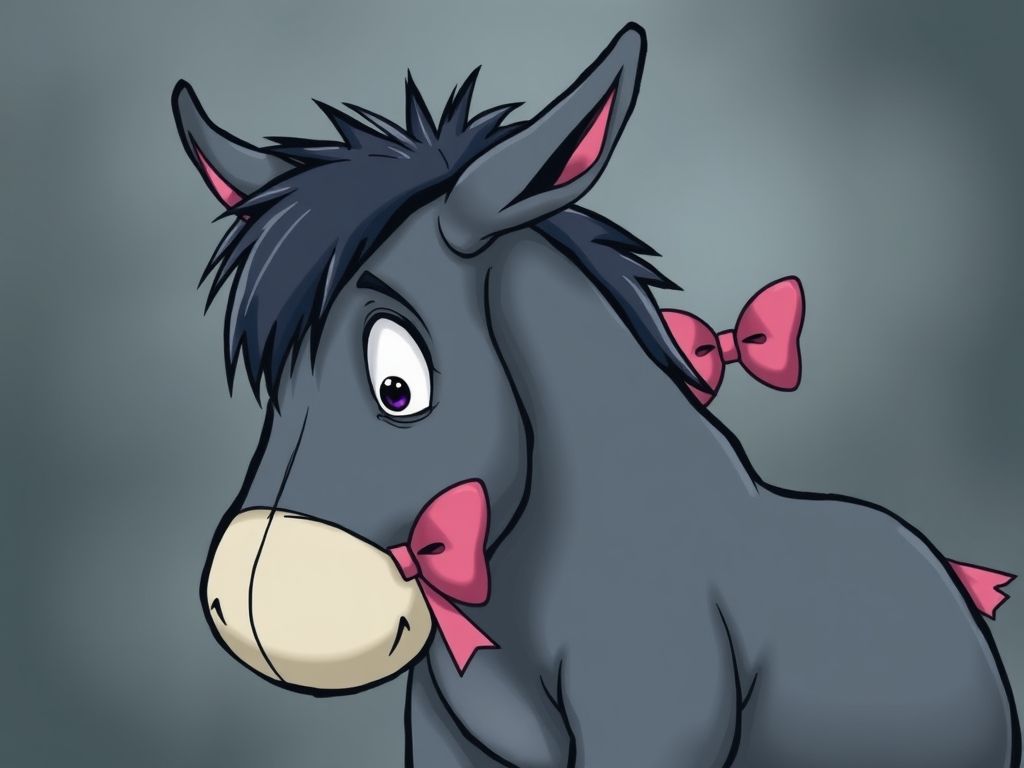Eeyore Basic Information

Eeyore the donkey, known for his gloomy outlook and detachable tail.
Creation Info
First Appearance
1926 (in Chapter 4 of A. A. Milne's 'Winnie-the-Pooh' book)
Creator
A. A. Milne (Author), E. H. Shepard (Illustrator)
Series
Winnie-the-Pooh (books), Various Disney Winnie the Pooh series and films
Copyright
Disney Enterprises, Inc. (for Disney adaptations, original works public domain in some regions)
Identity
Species
Stuffed Donkey
Gender
Male
Age
Ageless (stuffed animal)
Birthday
Unknown (often associated with gloominess)
Occupation
Resident of the Hundred Acre Wood, Professional Mope
Eeyore's Appearance
Physical Features
Height
Shorter than Christopher Robin, taller than Piglet
Body Type
Stuffed donkey, somewhat slumped posture
Color Scheme
Grey fur (often blueish-grey in Disney merchandise), pink inner ears and muzzle (in Disney version)
Signature Style
Outfit
Wears no clothing.
Catchphrase
"Thanks for noticin' me.", "Ohhh-kayyy.", (Various gloomy or sarcastic remarks, often ending with a sigh)
Accessories
Detachable tail, usually with a pink bow, attached with a nail or drawing pin.
Eeyore Character Background
Origin Story
Eeyore originated in A. A. Milne's 'Winnie-the-Pooh' books, based on one of Christopher Robin Milne's actual stuffed animals. His name is an onomatopoeia representing the braying sound of a donkey ('hee-haw') as pronounced in Milne's non-rhotic British English accent. He lives in the southeast corner of the Hundred Acre Wood, in a spot designated 'Eeyore's Gloomy Place: Rather Boggy and Sad,' where he often rebuilds his easily collapsible stick house.
Character Timeline
Book Debut
Introduced in Chapter 4 ('In which Eeyore loses a tail and Pooh finds one') of 'Winnie-the-Pooh'.
Disney Animation Debut
Appeared in Disney's first Pooh featurette, 'Winnie the Pooh and the Honey Tree,' voiced memorably by Ralph Wright.
Losing His Tail
A recurring event where Eeyore's pinned-on tail becomes detached, requiring his friends to find and reattach it.
House Collapses
His humble house made of sticks frequently falls down, often needing to be rebuilt by him or his friends.
Eeyore's Personality
Personality Traits
- Chronically gloomy and pessimistic.
- Generally depressed and anhedonic (lacks pleasure).
- Sarcastic with a very dry wit.
- Stoic and resigned to misfortune.
- Low energy and speaks in a slow monotone.
- Accepting of his friends, despite their flaws or perceived lack of intelligence.
- Capable of deep compassion and loyalty, though rarely expressed enthusiastically.
- Appreciates small gestures, though may downplay them.
- Often expects the worst to happen.
Strengths
- Loyalty to his friends.
- Resilience (endures his gloom and misfortunes).
- Dry, sarcastic humor.
- Understated wisdom and observational skills.
- Surprisingly good at Poohsticks.
Weaknesses
- Overwhelming pessimism and negativity.
- Lack of enthusiasm or motivation.
- Prone to losing his tail.
- His stick house is poorly constructed and often falls down.
Goals
- To find his lost tail.
- To have his house remain standing.
- To endure the day.
- (Perhaps secretly) To feel noticed and appreciated by his friends.
Fears
- (Does not express overt fears, more a general expectation of misfortune).
Eeyore's Gallery
Eeyore's Abilities
Special Powers
- Enduring patience.
- Ability to withstand significant gloom.
Skills
- Making dry, sarcastic comments.
- Building (and rebuilding) stick houses.
- Being surprisingly good at the game Poohsticks.
- Accepting misfortune with resignation.
Eeyore's Relationships
Friends
Eeyore Awards & Recognition
- As part of the Winnie-the-Pooh franchise, Eeyore shares in its numerous awards and accolades.
Eeyore Cultural Influence
Pop Culture Impact
Eeyore is one of the most recognizable and quoted characters from Winnie-the-Pooh, representing melancholy and pessimism, yet remaining beloved. His gloomy demeanor and catchphrases are iconic. He is often seen as a relatable figure for those experiencing sadness or depression, appreciated for his quiet resilience and the acceptance shown by his friends.
Social Impact
Eeyore's character allows for discussions about sadness, depression, and acceptance within children's literature and media. The way his friends accept his gloominess without trying to force him to be happy is often seen as a positive message about friendship and supporting those with mental health struggles.
Eeyore's Theme Colors
More About Eeyore
The Detachable Tail
One of Eeyore's most famous characteristics is his tail, which is attached by a nail or drawing pin and frequently falls off. Much of the plot in some stories revolves around Eeyore losing his tail and his friends' efforts to find it for him. Owl once famously mistook it for a bell-pull. The pink bow on the end adds to its distinctiveness.
Eeyore's Gloomy Place
Eeyore resides in a specific part of the Hundred Acre Wood designated on the map as 'Eeyore's Gloomy Place: Rather Boggy and Sad.' Here, he lives in a simple house made of sticks, which is prone to collapsing, especially on windy days or when bounced upon by Tigger. Despite its name and condition, it's still his home, and his friends often help him rebuild it.
Eeyore In Their Own Words
Character Introduction
Hmph. Hello. It's Eeyore. Not that anybody noticed. Just standing here. In my corner of the Forest. Suppose it's morning... for some.
Personality Traits
Someone said gloomy. Might be right. Things generally go wrong. Tail falls off. House falls down. It snows. Or rains. Or the sun shines too brightly. It's all the same, really. Got my friends, though. Pooh, and Piglet, and Tigger... bouncy fellow. They try. Not much point, but... thanks for noticin', I suppose.
Classic Stories
Stories? Mostly involve my tail falling off. Or my house collapsing. Or someone having a birthday... which is just another day, really. Here today, gone tomorrow. Sometimes we play Poohsticks. Surprisingly good at that. Floats better than some. Not that it matters much.
Cultural Impact
Me? Made an impact? Hard to believe. Most likely just a mistake. People probably just feel sorry for the gloomy old donkey. Still... nice of them to notice, I guess. Don't expect it to last.